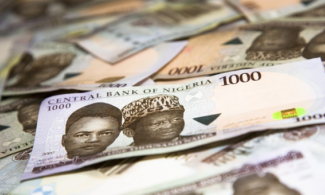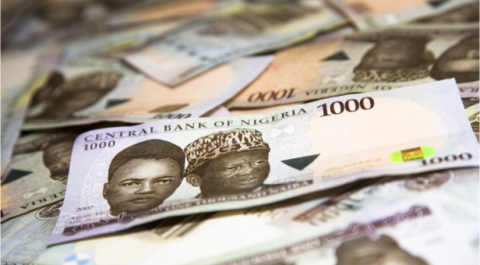
Africa's largest economy devalued the local unit twice last year after a crash in the oil price triggered by the coronavirus pandemic hampered revenues.
In view of the peculiar economic situation in Nigeria, experts have predicted why the Nigerian currency would crash further in the coming months.
Nigerians now save in foreign currencies to protect their wealth from naira volatility and surging inflation, a recent research paper published by the Central Bank of Nigeria on its website says.

Africa's largest economy devalued the local unit twice last year after a crash in the oil price triggered by the coronavirus pandemic hampered revenues.
While crude contributes less than 10% to the country's gross domestic product, it accounts for nearly all foreign-exchange earnings and half of the government revenue in the continent's biggest commodity producer.
The naira had lost 66% of its value since 2009 when it exchanged at N149 to the dollar.
Checks by SaharaReporters on Wednesday revealed that one dollar was equal to N495. Nigeria's inflation quickened to the highest level in four years in March and is now more than double the 9% limit of the central bank's target range.
The Central Bank previously issued a warning to merchants to stop offering local goods in foreign currency and also banned the practice of accessing the foreign exchange market for settling domestic transactions.
Speaking with SaharaReporters on Wednesday, experts explained why the naira would further crash while hammering on what Nigerians and the Nigerian government should do.
An economics professor, Leo Ukpong, stated that the naira would further devalue due to the security threats in the country, which he said drives away foreign investors.
With the uncertainty in the country, foreign investors are very likely to withhold their potential investment, he stressed.
He also stated that those with investments in Nigeria are likely to withdraw and establish in neighbouring countries that are considered more stable.
Ukpong laments that Nigeria's manufacturing capacity is very low compared to the size of its economy. This, he said, makes the country import more than what it's produced, thereby placing higher pressure on the naira.
He said, "The problem with our naira is probably multifaceted but we can narrow it down to a couple of things. One is the uncertainty in the entire economy; uncertainty driven by militants, bandits and whatever they call themselves.
"That is a serious political uncertainty. Thus, foreign investors are not sure of the peace and stability of the country. Normally, if you are not sure, you either withhold your potential investment into such a country or draw money from what you have invested, affecting our currency negatively.
"It will cause a depreciation pressure on the naira and because we will be demanding that currency; we will be willing to pay more naira for US Dollar, Pounds, Euro or whatever.
"That uncertainty is one part. The other part is that we are very low on manufacturing capacity. In other words, apart from raw agricultural products that we can manufacture to meet the internal demand, we are importing too many things. Things we could be manufacturing in Nigeria are being imported. If you are importing, you have to come up with more of your currency to pay for it. Our very low manufacturing capacity to produce the final goods that we need is also putting negative pressure on the naira.
"When you combine those two items, it doesn't matter what you do; your currency will depreciate. I don't see a way out of this in the short term."
Also speaking, an economist, Johnson Chukwu, told SaharaReporters that the naira has so far depreciated due to the negative balance of trade of the country in international trade.
He said, "Why naira depreciated is because we have gotten to a point in our international trade where the balance of trade is negative; balance of trade means the value of the trade you export compared to the value of the trade you import.
"We are importing more goods than the value that we are exporting, and our major exporting is crude oil, so, at some point, crude oil was low and then quota for Nigeria.
"We had a negative balance of trade. On the invisible sides, on the current account, where you compare capital inflows and capital outflows, many foreign investors have been exiting the Nigerian market.
"The economy has witnessed outflows from foreign portfolio investors, which has made our overall balance of payment negative. The currency is depreciating because our capital inflow is lesser than our capital outflow, so we have a negative balance of payment. That is a major factor."
The two experts advised Nigerians and the federal government on what to do to stabilise the naira further.
Ukpong said, "In terms of what we can do to save ourselves, I am not the only one here; most of the experts have said the same thing.
"One, we have to manufacture what we need in Nigeria, our final goods. How can we have a refinery and we are still importing fuel? We ship it down to foreign countries; they refine it and put all kinds of overheads and ship it back to us.
"Most of the local goods that we are consuming, we are not able to produce enough. Even if we can produce them, it is not enough to meet our internal demands; we have to meet our internal demands before exporting anything.
"Let's also take a look at which of the issues we can handle short term. Short term, we need to tackle the insecurity all over the country, most especially the kidnapping of poor children. Schools are all in a state of uncertainty. If the government cannot use our policing power and security agencies to quell that, let's not think of any foreign investor bringing in any business to Nigeria.
"The ones that were here will probably move to neighbouring countries where there is relative stability and manufacture there. You buy from them and bring them to your country because they don't feel secure. That is the short term.
"Long term, if we can create that relative stability in this country, then we have to invest in manufacturing. Without that, the naira will still fall because our demands for foreign goods are too high and no matter what we do. Until we start producing those goods, using our labour, our machinery, it will still put pressure on the naira."
On his part, Chukwu advised Nigerians, who can invest in foreign currency, to do so.
He stated that this is the surest way to protect one's wealth against the devaluation of the naira.
He said, "If anybody can invest in foreign currency assets, then it makes sense. That is one aspect of protecting your wealth against naira currency depreciation. That is the surest way to guide against loss of your wealth, but the other aspect is what the government should do.
"It should focus on improving our infrastructural supply to reduce the cost of doing business and reduce the cost of production in the economy as well as improve the quality of our finished products so that they can compete in terms of quality and cost with goods produced elsewhere in the world.
"That means we will begin to command the export market and once we begin to export more commodities, more items, more goods and services out of the country, our balance of trade will improve. Our balance of payment will improve, we will have stability in our reserve. We will see an appreciation in reserve, which we will be able to stabilise.
"The other aspect is what the CBN is doing; they are increasing the yield on treasury bills. Today, the yield is about 9.75%. What that means is, they want to make short term debt instruments attractive to foreign portfolio investors so that we will hopefully begin to see a return of foreign portfolio investors. This will help strengthen the foreign exchange capital flow and strengthen the reserve and moderate the currency depreciation."
The decline in the value of the naira has attracted the attention of many Nigerians. Former presidential aide Reno Omokri, in his Youtube masterclass series titled, 'Why The Value Of The Naira Will Crash' also explained what Nigerians could do to protect themselves
He said, "The value of the naira will further crash and the reason for this is that the value of money is determined by the demand for it just like the value of goods and services. The demand for the Nigerian naira is not very high right now. This might look contradictory because the Nigerian naira is the legal tender of Nigeria.
"However, let's go deeper into Economics. How many of the things you buy with the naira are made in Nigeria. Think about it. Let's look at everyday items-- the food that Nigerians eat is to a large extent imported. The rice is imported, even though General Muhammadu Buhari likes to deceive people. There is locally grown rice but it does not exist in enough quantity to feed the country. The beef that Nigerians eat is imported into Nigeria by herdsmen from Mali and Senegal.
"The oil (cooking) is largely imported. Your cars are imported into Nigeria; fuel is also imported. The computer you use at the office, the air conditioner, the furniture you use in the office are mostly imported. If you look at the clothes that people wear, including President Muhammadu Buhari, they were imported. The value of the naira is not circulating internally in Nigeria's economy. Something like 65% of the value of our naira services the economies of those countries we import from.
"The only thing that I will tell you is, if you have naira, go and get your reserve in dollars or pounds or any foreign exchange. As long as this government is in power, the naira is going to crash. I have given you facts and details. If you are caught in this economic quagmire, don't blame anybody but yourself."